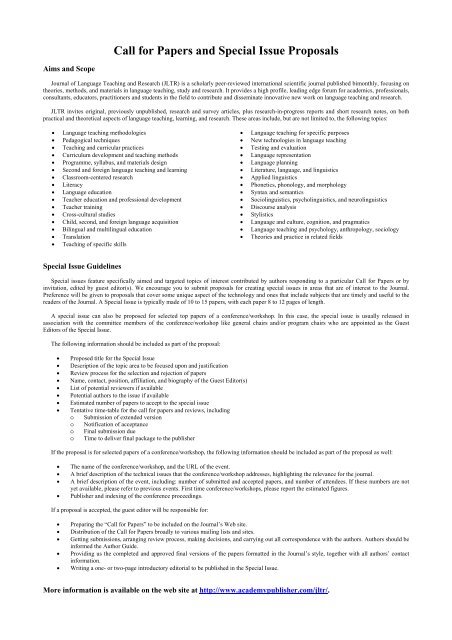Journal of Language Teaching and Research Contents - Academy ...
Journal of Language Teaching and Research Contents - Academy ...
Journal of Language Teaching and Research Contents - Academy ...
Create successful ePaper yourself
Turn your PDF publications into a flip-book with our unique Google optimized e-Paper software.
Aims <strong>and</strong> Scope<br />
Call for Papers <strong>and</strong> Special Issue Proposals<br />
<strong>Journal</strong> <strong>of</strong> <strong>Language</strong> <strong>Teaching</strong> <strong>and</strong> <strong>Research</strong> (JLTR) is a scholarly peer-reviewed international scientific journal published bimonthly, focusing on<br />
theories, methods, <strong>and</strong> materials in language teaching, study <strong>and</strong> research. It provides a high pr<strong>of</strong>ile, leading edge forum for academics, pr<strong>of</strong>essionals,<br />
consultants, educators, practitioners <strong>and</strong> students in the field to contribute <strong>and</strong> disseminate innovative new work on language teaching <strong>and</strong> research.<br />
JLTR invites original, previously unpublished, research <strong>and</strong> survey articles, plus research-in-progress reports <strong>and</strong> short research notes, on both<br />
practical <strong>and</strong> theoretical aspects <strong>of</strong> language teaching, learning, <strong>and</strong> research. These areas include, but are not limited to, the following topics:<br />
• <strong>Language</strong> teaching methodologies<br />
• Pedagogical techniques<br />
• <strong>Teaching</strong> <strong>and</strong> curricular practices<br />
• Curriculum development <strong>and</strong> teaching methods<br />
• Programme, syllabus, <strong>and</strong> materials design<br />
• Second <strong>and</strong> foreign language teaching <strong>and</strong> learning<br />
• Classroom-centered research<br />
• Literacy<br />
• <strong>Language</strong> education<br />
• Teacher education <strong>and</strong> pr<strong>of</strong>essional development<br />
• Teacher training<br />
• Cross-cultural studies<br />
• Child, second, <strong>and</strong> foreign language acquisition<br />
• Bilingual <strong>and</strong> multilingual education<br />
• Translation<br />
• <strong>Teaching</strong> <strong>of</strong> specific skills<br />
Special Issue Guidelines<br />
• <strong>Language</strong> teaching for specific purposes<br />
• New technologies in language teaching<br />
• Testing <strong>and</strong> evaluation<br />
• <strong>Language</strong> representation<br />
• <strong>Language</strong> planning<br />
• Literature, language, <strong>and</strong> linguistics<br />
• Applied linguistics<br />
• Phonetics, phonology, <strong>and</strong> morphology<br />
• Syntax <strong>and</strong> semantics<br />
• Sociolinguistics, psycholinguistics, <strong>and</strong> neurolinguistics<br />
• Discourse analysis<br />
• Stylistics<br />
• <strong>Language</strong> <strong>and</strong> culture, cognition, <strong>and</strong> pragmatics<br />
• <strong>Language</strong> teaching <strong>and</strong> psychology, anthropology, sociology<br />
• Theories <strong>and</strong> practice in related fields<br />
Special issues feature specifically aimed <strong>and</strong> targeted topics <strong>of</strong> interest contributed by authors responding to a particular Call for Papers or by<br />
invitation, edited by guest editor(s). We encourage you to submit proposals for creating special issues in areas that are <strong>of</strong> interest to the <strong>Journal</strong>.<br />
Preference will be given to proposals that cover some unique aspect <strong>of</strong> the technology <strong>and</strong> ones that include subjects that are timely <strong>and</strong> useful to the<br />
readers <strong>of</strong> the <strong>Journal</strong>. A Special Issue is typically made <strong>of</strong> 10 to 15 papers, with each paper 8 to 12 pages <strong>of</strong> length.<br />
A special issue can also be proposed for selected top papers <strong>of</strong> a conference/workshop. In this case, the special issue is usually released in<br />
association with the committee members <strong>of</strong> the conference/workshop like general chairs <strong>and</strong>/or program chairs who are appointed as the Guest<br />
Editors <strong>of</strong> the Special Issue.<br />
The following information should be included as part <strong>of</strong> the proposal:<br />
• Proposed title for the Special Issue<br />
• Description <strong>of</strong> the topic area to be focused upon <strong>and</strong> justification<br />
• Review process for the selection <strong>and</strong> rejection <strong>of</strong> papers<br />
• Name, contact, position, affiliation, <strong>and</strong> biography <strong>of</strong> the Guest Editor(s)<br />
• List <strong>of</strong> potential reviewers if available<br />
• Potential authors to the issue if available<br />
• Estimated number <strong>of</strong> papers to accept to the special issue<br />
• Tentative time-table for the call for papers <strong>and</strong> reviews, including<br />
o Submission <strong>of</strong> extended version<br />
o Notification <strong>of</strong> acceptance<br />
o Final submission due<br />
o Time to deliver final package to the publisher<br />
If the proposal is for selected papers <strong>of</strong> a conference/workshop, the following information should be included as part <strong>of</strong> the proposal as well:<br />
• The name <strong>of</strong> the conference/workshop, <strong>and</strong> the URL <strong>of</strong> the event.<br />
• A brief description <strong>of</strong> the technical issues that the conference/workshop addresses, highlighting the relevance for the journal.<br />
• A brief description <strong>of</strong> the event, including: number <strong>of</strong> submitted <strong>and</strong> accepted papers, <strong>and</strong> number <strong>of</strong> attendees. If these numbers are not<br />
yet available, please refer to previous events. First time conference/workshops, please report the estimated figures.<br />
• Publisher <strong>and</strong> indexing <strong>of</strong> the conference proceedings.<br />
If a proposal is accepted, the guest editor will be responsible for:<br />
• Preparing the “Call for Papers” to be included on the <strong>Journal</strong>’s Web site.<br />
• Distribution <strong>of</strong> the Call for Papers broadly to various mailing lists <strong>and</strong> sites.<br />
• Getting submissions, arranging review process, making decisions, <strong>and</strong> carrying out all correspondence with the authors. Authors should be<br />
informed the Author Guide.<br />
• Providing us the completed <strong>and</strong> approved final versions <strong>of</strong> the papers formatted in the <strong>Journal</strong>’s style, together with all authors’ contact<br />
information.<br />
• Writing a one- or two-page introductory editorial to be published in the Special Issue.<br />
More information is available on the web site at http://www.academypublisher.com/jltr/.

















